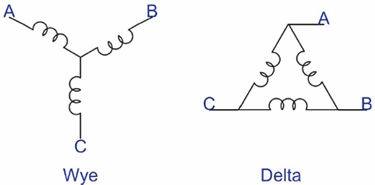Determining motor pole count
If magnetic pole count of permanent magnet AC/BLDC motor is unknown, there is an easy way to determine it experimentally.
Method 1
Needed items:
- 3 phase AC/BLDC motors
- A working servo drive
Procedure:
- Disconnect feedback device cable from drive, also turn of Hall sensor setting if it's on
- Set drive in torque control mode and enable it
- Manually set torque setpoint (with Granity Testing page TSP1 value and Set Abs button) to produce some noticeable torque on motor (motor not rotate but will start holding position when current is increased). Typically 10-30% of motor rated torque is sufficient.
- Rotate motor shaft by hand or tool and count the distinct snapping positions per one revolution.
- Motor pole count is twice as much as the number of snapping positions found in the previous step. I.e. if motor snaps 2 times per revolution, it means that motor has 4 magnetic poles.
| If motor does not hold, check that current is actually being driven to motor from Granity Testing page Output current value. If can't make it work, try method 2. |
Method 2
Needed items:- 3 phase AC/BLDC motors
- Adjustable lab DC power supply
Procedure:
- Wire DC power supply + and - wires between any of two leads of the motor. I.e. + to A and - to B while C is not connected.
- Use the PSU to drive some DC current to the windings. Don't exceed motor's current rating. A good starting value may be 10-30% of motor continuous current. Now motor should start holding position as the rotor's magnets snap to the driven windings.
- Rotate motor shaft by hand or tool and count the distinct snapping positions per one revolution.
- Motor pole count is twice as much as the number of snapping positions found in the previous step. I.e. if motor snaps 2 times per revolution, it means that motor has 4 magnetic poles.
Tips
- If motor is too stiff to rotate, reduce current.
- If snaps can't be felt, increase current to make them stronger.
- If motor has internal brake, it must be electrically opened before the test. Usually such brakes open with 24VDC voltage to brake wires. Check motor specifications first, or use lower starting voltage if unknown.
In no event the Product Information or parts hereof shall be regarded as guarantee of conditions or characteristics. The Product Information or any part thereof may also not be regarded as a warranty of any kind. No liability of any kind shall be assumed by Author with respect to Product Information or any use made by you thereof, nor shall Author indemnify you against or be liable for any third party claims with respect to such information or any use thereof.
As content of this Wiki may be edited by user community, Granite Devices Oy or it's affiliates do not take any responsibility of the contents of this Wiki. Use information at your own risk. However, Granite Devices staff attempts to review all changes made to this Wiki and keep information trustworthy.
Without written consent, Granite Devices' Products or Intellectual Property shall not be used in situations or installations where living beings, material property, or immaterial property could be harmed by the operation, features or failures of Product. Products may only be used in a way where hazards like moving parts, electric shock, laser radiation, or fire can't be realized even if the content of this Wiki would suggest otherwise.
